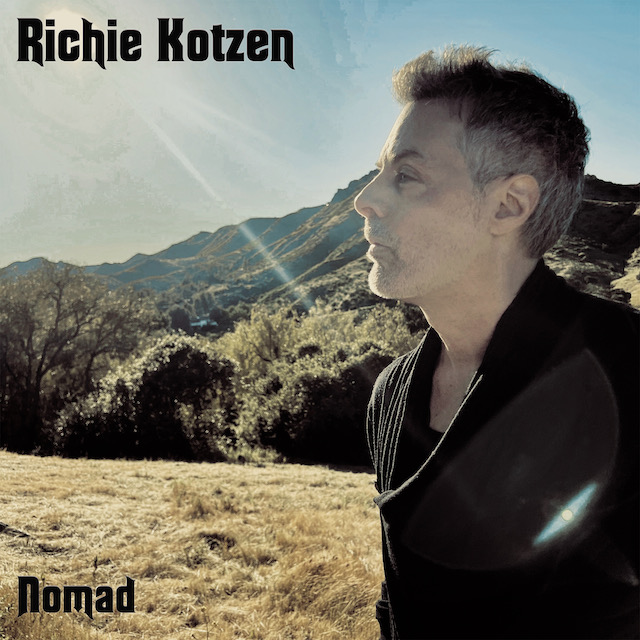RICHIE KOTZEN - "This Isn't A Test; This Is A Song"
September 25, 2024, 3 months ago

Guitarist / singer / songwriter / multi-instrumentalist Richie Kotzen (The Winery Dogs, Smith/Kotzen) will release his incredible new solo album, Nomad, on September 27 via global music company BMG.
Nomad is comprised of eight songs containing numerous different flavors and vibes, stylistically spanning several decades and genres, yet it’s all cohesive as Nomad by Richie Kotzen. Did the wandering aspect of this music lend itself to the title Nomad? “No, but I’m going to use that in my next interview and tell them that’s why. It’s a proper Richie Kotzen record. I’ve had these conversations with people before, and sometimes it ends up in a debate, but my attitude is, the artists I listened to growing up were diversified; they weren’t monolithic in their writing and their albums. So, just by nature, I guess I kind of have a bit of a pendulum swing to what I’ll write. I don’t go too far in one direction or the other meaning, I’m not going to write a polka record or a flamenco record.”
“I grew up listening to rock, but I also have a side that… I grew up listening to Parliament Funkadelic, and Sly And The Family Stone, and Curtis Mayfield. So, there’s that swing. And there was a period where I got into jazz fusion, so that’s in my DNA. That’s my makeup. So, when I write and record, I have those influences behind me. And that’s why you get something like Nomad. But again, when I listen to some of the artists I grew up listening to, they also would have – one song on the album would be an acoustic song, one song would have distorted guitars, and something else would be a little more funky. Led Zeppelin were a great example of that. When you listen to a Led Zeppelin record, they were very diverse.”
In addition to being the title of the record, Nomad is the name of track four, which is a very jazzy, cool piece of music. Kotzen reveals why he chose to call the album Nomad: “Well, I think because of the song. I think the song represents something stylistically that I feel represents me well. The two songs that existed the most were ‘Nihilist’ and ‘Nomad’. They were around the longest; they’re the oldest. I didn’t want to call the record Nihilist, cause I think that would be too dark; I’m not quite there yet. But I like the idea of how it ties everything together, and the cover kind of ties in well with that title. So, there wasn’t any kind of real – I didn’t have a title, and then go and make the record. The song existed first. Somewhere between the songs ‘Nomad’ and ‘Nihilist’, I had an album that was built around that. So, I went with the title Nomad.”

Speaking of the album cover, that photograph was taken in Kotzen’s backyard; his house sits on a beautiful piece of property on the west coast. “I know, I’m pretty lucky,” admits Richie. “I live in southern California. We’re on our own little hilltop. Our hill is inside a valley of mountains, so it’s a really interesting view, how we kind of look down on what’s below, yet there’s mountains that look down on us. It’s really pretty, I really like it here.”
Kotzen’s album covers have always been just him. He’s never utilized distinctive artwork or enigmatic imagery. Quite simply it’s, here’s a picture of Richie Kotzen at this point in time. “Yeah, I guess that’s pretty accurate. That’s true. If I were an artist that could paint well – maybe I can? I only made one painting. I never really got into it, maybe I should. But if I had that side, I would probably go with something like what you’re describing, but I went with the photograph vibe. I just thought when that picture was taken that it looked like an album cover to me. It’s funny, I told my wife Julia, I said, ‘Do you mind coming outside and taking a couple of photographs of me?’ I don’t have any photographs of what I look like today, cause I’d cut my hair. So, she took a bunch of them. Then I said, ‘Just take one like a profile.’ When she did that, that was the only one – there might have been two – I thought, that looks like it could be an album cover. I kind of like that. So, I went with it.”
Delving into some of the songs found on Nomad, we begin with “This Is A Test”. Acoustic guitar and vocal; simple, yet oh so beautiful. And Kotzen sings, “I’m gonna pass it fine,” in answer to the title, “This Is A Test”. Richie shares what inspired those lyrics, and what exactly this test is about. “Well, I’ve got to tell you, this song came about in the weirdest way. I was getting ready to fly back to Philadelphia to visit my parents, and I wanted to have a little studio set-up. So, I have this microphone, this interface, a guitar, and the computer. I plug all this stuff in here at home, and I wanted to test it to make sure it worked. I hit ‘record’, I started playing the guitar, and I started singing a melody; the melody that’s in the song. I went through these changes, and at the end of each phrase I went, ‘This is a test, and this is a test.’ And then I went on to sing some more. So, I did that for a verse, pre-chorus, chorus, verse, pre-chorus, chorus – and then I stopped. And when I listened to it, to make sure everything was working, I was like, ‘Wait a minute! This isn’t a test; this is a song.’ I realized that I’ve got something here that I can work on when I get home, when I get back to Philadelphia. So, that’s how it evolved. I filled in the blanks, and I guess the obvious thing, the first thing you would think is that life is a test. You’ve heard people say that. But I think, in that song, I’m referring to a relationship being an ongoing test, and running out of steam in that test. If you’re testing me, I will pass it because I’m going to exit the test. I think that’s kind of the gist of the song.”

“These Doors” is completely different as it’s funky with an uplifting melody. Kotzen’s gift as a lyricist makes the listener try to get inside his head – “Sometimes I feel like it’s all in vain.” With so many fans around the world, how could he possibly feel that way? “Oh, I don’t. I don’t feel it is at all,” assures Richie. “I just sang that as the opening line for the first verse cause I needed something to sing. So, basically, the song is one of those songs where… what I like most about the song in all seriousness is the line, ‘You’re slamming doors in my face, but these doors only open up from inside.’ So, if you think about people that try to play mind games and shut you out of things, and then they want to come back and kind of, I don’t know, play nice and start the game all over again. But the reality is, I guess what I’m trying to say in that song is, you’re in charge of who you let into your circle and into your life. I think it’s more meant as an empowerment song, that you have control over situations.”
“A lot of times people are like, ‘This happened to me, that happened to me, and I don’t know why?’ But often, it has a lot to do with the choices you make, and the situation and position you put yourself in. Then once you’re in it, how do you handle it? So, that’s really where it’s coming from. The idea that you’re doing it all for nothing is not really true. What’s true is, sometimes you might feel that way, which is what I actually sing. But it’s not true because it’s just a game that leads you to feel that way. I think the next line is, ‘But that’s the game we play.’ I think life really is, on a lot of levels, a game of manipulation in order to get where you want to get to. It’s really difficult to get to where you want to get to, if you don’t know where it is you want to go. But, if you do know where it is you want to go, you have a chance to get there, but you’ve got to play a game. You’re in an obstacle course. There’s people that are involved that might not want you to achieve certain things. Then you have to navigate through that. And there’s other people that might pose as they can help you. But they might only help you up to a certain point, and then it gets to be a little bit uncomfortable. That’s kind of the world of that song. It’s not that I think it’s all for nothing and I’m going to give up, it’s actually quite the opposite.”
“Cheap Shots” was released as the first single / promo video, which has a boxing theme to it. But the song’s not about boxing. However, some fans in Reading, Pennsylvania might be a little upset with Kotzen because of the lyric, “You’re taking cheap shots all because you know you’re gonna die somewhere in Reading, PA.” Richie quickly clears up any misconceptions. “Reading is where I was born. It’s a lovely town, and I still have many friends there. I have the utmost respect and pride for my upbringing. However, the song deals with a subject that… the person is well described in the song. You ever meet someone that all they do is talk. And in their talking, they’re insulting you and everybody else around them. The reality is this person is probably never going to go beyond where they are. And it just so happens that this person, when all this kerfufflery was happening, was in Reading, PA. So, it’s not a diss to anyone in Reading, because actually the most successful entertainer in the world was born in Reading, PA, and that’s Taylor Swift. Reading, PA is definitely a very important place on the map. It was just used figuratively to kind of put someone in their place.”
Richie takes “Cheap Shots” to the next level when he sings, “Do you wanna be dead in a bullet proof vest with your head infested?” “Nice that you picked that out! I had a friend ask me what that meant. Because this person lives very recklessly, I asked the question – is that what you want? Is that what your end game is? That’s where I was coming from. When I say, ‘In a bullet proof vest with your head infested,’ obviously there’s a rhyme theme happening and those words dropped in perfectly. But the reality is, it’s a person that might take care of their physical appearance, but their head is infested with madness and nonsense. So, you know, you’re going to go out protecting your appearance, your body. But it’s your mind that needs work and needs protecting, and that’s what’s going to take you out. So that’s how that all comes together – ‘Do you wanna be dead in a bullet proof vest with your head infested?’ If you look at that visual, if you imagine that, the person’s protecting something, but they’re not protecting the right thing.”

All vocals, guitar, bass, and drums on Nomad were performed by Kotzen, with the exception of two songs. There’s a guest drummer on “Nomad”, Dan Potruch, and a guest drummer on “These Doors”, Kyle Hughes. “So, both of those fellas have toured with me, and I love both of those gentlemen dearly,” begins Richie as he elaborates upon this pair of musical cameos. “I have a long, long history creatively with Dan Potruch. He’s played on a couple of my albums in the past. He’s toured with me in South America, he’s played many a gig with me in southern California. He was meant to be on the tour with me, unfortunately there was a schedule conflict. Then I was lucky enough to find Kyle to step in. But they’re both on the record, that’s true. I’ll talk about Dan’s contribution - it was very interesting because the song ‘Nomad’ was done.
“What I had achieved, what I had accomplished with – I programmed the drums, and when I mixed it, I thought, I don’t like the fact that these drums are not played by a person. I don’t think anyone would have known they were programmed; because he didn’t know they were programmed when I sent the demo. I said, ‘I want you to learn this, and I want you to play it.’ So, he came in and he charted everything and learned my parts. He played it, and then we did a pass with him being a little more free and loose with his personality, and that’s the pass that I used. But they were still my initial parts that were being recorded. He was so incredible because, in Pro Tools, when you record, it shows you the wave form and where you’re sitting in the click track. I never saw anyone sit that accurately in time. It was incredible! It sounded like we played it together at the same time. I was blown away! Obviously, it ended up on the record. I love what he did.”
“Kyle was at my house recording some drums for another project. We got done with that and I had an idea for something. I had a talkback, and I said, ‘Kyle, I want you to play this beat.’ And I sang him a drumbeat. I said, ‘I want you to play this for about two minutes, and I want you to improvise around it, do some fills. Then we’re going to stop, and I’m going to give you another beat at the same tempo.’ So, I did this with maybe three or four different variations. That sat on my hard drive for months. Then suddenly I wrote the song ‘These Doors’, and I realized I had those drum performances from Kyle. I went back and I realized, this is going to fit right here. Actually, I ended up using Kyle as if he was a drum machine. But he’s on the record as well. And it came out really cool, definitely enhanced that song.”

All eight songs on Nomad are great. You don’t need a 12-song album when all eight songs are as superlative as these are. “I’m so glad you said that,” beams Kotzen. “I’m going to tell you something. I was looking at albums that I liked from my youth. There was two Bad Company records, they were eight songs. I think there was an early Rod Stewart record, I don’t know if it was Every Picture Tells A Story, or a different one. Born To Run – Bruce Springsteen, I believe was one of them. There was about 20 of them, they were eight song albums that were just so amazing. I was looking and I thought, ‘Man, the last record I made had 50 songs (50 For 50, released in 2020). It’s clearly okay to make a record with eight songs.
“Like I said, I had written ‘Nihilist’ and ‘Nomad’, and I thought they would be two songs either to open each side of the album, or perhaps end it. Then I started going through my ideas, and I came up with what I came up with. I thought, ‘This is an album!’ I had four songs per side. And I actually sequenced it as if it were an album; whether I was going to make an album or not; just do CDs or just do streaming, who cares. I sequenced it as if it were an album. Then when I was doing recording and production, I was thinking about albums, like what translates, what comes through? As opposed to having a gazillion overdubs that can easily get lost. So, I kept things relatively simple, in my opinion.”
“Probably the most complex recording on the album is ‘Nihilist’, maybe ‘These Doors’. But in general, ‘Nomad’ is super simple, ‘Cheap Shots’ doesn’t get any more simple. Same thing with ‘On The Table’. I wanted to make the record I made. And here’s the beauty of all of this, that I love the most – the record was done. I sent it to the pressing plant in New Jersey to make some vinyl to have, to sell. That’s when I found out, BMG likes it, they want to put it out. What’s so amazing is the record’s done! In the past when I’ve worked with Geffen or Interscope, or any other label, they had their hands in there - which can be good, but also can be frustrating. This time, it was just me, like it is on most of my albums today. Into The Black (2006), Get Up (2004), those albums are just me, but I’m putting them out independently. But this time, it’s just me and I’ve got a team behind me at a major label; they know what they’re doing. It’s just a lovely thing to have a record that is the record I would have made under any circumstance, and here we are putting it out together. It’s a beautiful thing, I’m very happy!”
The aforementioned topics of “On The Table”, and Kotzen’s hard drive, are two elements that tie together as the music had been kicking around for a while, just sitting on Kotzen’s computer. When a fond family memory arose, the lyrics came into being, as Richie recalls. “Basically, the song itself was written about a year ago, as far as the music. Frankly, I had originally written that music thinking Smith/Kotzen. I’ve had that sitting around thinking, Adrian might like this. By the time we got together, there was all this other stuff, and we never got to it. So, the album got done and this never came to light. I had the track. I’ll call it a track; the music for it. My father-in-law sadly passed away about five years ago. But when we were together, he did not speak. He never learned fluent English, but he knew a few phrases. We were joking that in Brazil, one of the first things they teach you how to say is, ‘The book is on the table.’ I’m like, ‘Why? Why do you need to know that?’ When I learned a couple of Italian phrases, the first thing I learned was ‘I’m hungry’, and ‘Where’s the bathroom?’ We were joking around about that, but that stuck with me. At the beginning of this year, I was saying, ‘What do I have that I never finished?’ I pulled that up, and the melody was already there. In that scat, I said ‘The book is on the table.’ Again, it was nonsense. I’m thinking, ‘Alright, why don’t you try and write a story around “The book is on the table.”’ I pulled that out of my head.”
“This person’s trying to hide their true colors, but they can’t because the book is on the table for everybody to read. That’s how I pulled it together. And something about the error of your ways is an expression that always stuck with me. I figured, let me try to tie that together. So, I came up with the chorus. For me, the part I love the most about what I do, believe it or not, is not getting the right guitar sound or figuring out where the solo should be, it’s how could I tell the story in a way that sings well, and that comes out of the speakers pleasantly. That’s the part that I love. So, to take that track, it sat there for a year with no direction and come up with a story – and the label heard that song. They said, ‘We want this to be the second single.’ I would have never thought to do that. I thought, maybe ‘These Doors’ should be the second single. They grabbed it and they took it, and people seem to like it. I had more spins on that song as a single than I ever had before. I was shocked. I could see my back end of Spotify and I saw all these numbers on there – wow! See, that’s the beauty of a record company. They see the picture from far away.”

We wrap up with “Escape”. Another exceptional song on Nomad. Again, lyrics that make the listener wonder as Kotzen sings, “I want to get out, I want to escape. I’m gonna get out, I’m gonna escape.” Escape from where or what? “Yeah, there you go. That’s the question. That could be anything for anybody. That song came to me in my sleep. I remember waking up with that melody and that lyric. I didn’t know where that was going to go, but I ran to the living room at three in the morning, grabbed the guitar, and recorded that so I wouldn’t forget it. I think the reality is, the song is about feeling trapped in a situation, and wanting to get out of the situation, and not knowing a way out. I think that is a problem for a lot of people. A lot of people get in positions in life, and it could be anything. It could be an abusive relationship; it could be a bad situation at their job. But when you feel trapped in a situation, that’s when you make dangerous decisions, and do things that are regrettable. As opposed to sitting down and realizing there’s always an option, a way out.”
“I had a person in my life that was constantly in turmoil. I would talk to them and every time they would present me with their problems, I would have the solution. And it was a solution that would work. Rather than take it, they would argue it and tell me why that wouldn’t work. They fell back in the corner. Sadly, this person took their life. It’s just this situation of when you feel like you’re trapped, and that’s, I think, cause I don’t over psycho analyze this sh*t, but I think that’s where that might have come from. That might have been why I wrote that song, because when people feel like they’re trapped, and they want to get out and escape, you may do regrettable things. That’s kind of the energy of where that might have come from. But it could be anything, what you’re escaping from. I’m not writing necessarily about me all the time. It’s a thought that comes to me and I start riffing on it.”
(Photos by Juergen Spachmann, and Vecc Schiafino)











